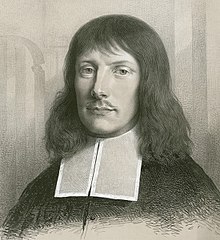Joachim Neander
| Joachim Neander | |
|---|---|
 |
|
| Born | 1650 Bremen, Germany |
| Died | 31 May 1680 Bremen, Germany |
| Nationality | German |
Joachim Neander (Neumann) (1650 – 31 May 1680) was a German Reformed (Calvinist) Church teacher, theologian and hymn writer whose most famous hymn, Praise to the Lord, the Almighty, the King of Creation (German: Lobe den Herren, den mächtigen König der Ehren) has been described by John Julian in his A Dictionary of Hymnology "a magnificent hymn of praise to God, perhaps the finest creation of its author, and of the first rank in its class." Due to its popularity it was translated several times into English - Catherine Winkworth being one of the translators in the 19th century -, and the hymn has appeared in most major hymnals.
Neander wrote about 60 hymns and provided tunes for many of them. He is considered by many to be the first important German hymnist after the Reformation and is regarded as the outstanding hymn writer of the German Reformed Church.
Joachim Neander was born in Bremen, the son of a Latin teacher. His grandfather, a musician, had changed the family name from the original Neumann ('New man' in English) to the Greek form Neander following the fashion of the time. After the death of his father, he could not afford to study at a famous university. He therefore studied theology in his hometown from 1666 to 1670. At first, his heart was not in it. It was only when he heard a sermon of Theodor Undereyk (shortly before the end of his course) that his beliefs became serious.
In 1671 he became a private tutor in Heidelberg, and in 1674 he became a teacher in a Latin school in Düsseldorf, one step before becoming a minister. While living there, he liked to go to the nearby valley of the Düssel river, nature being the inspiration for his poems. He also held gatherings and services in the valley, at which he gave sermons. The Neandertal (German thal for valley, modernized to tal) was renamed in his honor in the early 19th century, and became famous in 1856 when the remains of the Neanderthal Man were found there.
...
Wikipedia
